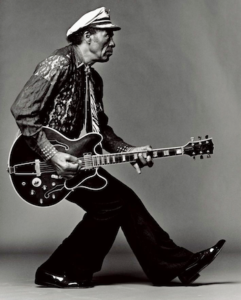
Chuck Berry
Chuck Berry was born on this date in 1926. He was a Black Rock and Roll musician and songwriter.
Charles "Chuck" Edward Berry was born in San Jose, California, and grew up in St. Louis. In the early 1950s, Berry led a popular blues trio at night and worked as a beautician daily. He made friends with Muddy Waters, who introduced him to Leonard Chess, head of Chicago-based Chess Records. The song on his audition tape, "Ida Red," won the record company Maybellene.
Released on August 20, 1955, Maybelline went to Number 5 on Billboard and established Berry as a black artist who successfully crossed over to the white pop charts. He transitioned when many other deserving and talented black artists in the 50s didn’t, and theories about why are multiple. His fame had a lot to do with his knack for language. Berry offered persuasive statements about the experience of being a teenager in the changing world of the 50s. He explained the boredom of classroom-bound students in "School Days" ("Soon as three o'clock rolls around/You finally lay your burden down").
In "Rock and Roll Music," Berry described the liberating appeal of rock and roll itself: "It's got a backbeat; you can't lose it." He said, “Everything I wrote about wasn't about me, but about the people listening.” Berry gave rock and roll a classic character in "Johnny B. Goode" and was responsible for one of its most recognizable stage moves, his "duckwalk.”
All the while, his catalog, hits, and lesser-known songs like "Little Queenie" and "Let It Rock" were mastered by eager wannabes on the other side of the ocean: Keith Richards, John Lennon, and others. The Beatles, the Rolling Stones, and many other British Invasion acts covered Chuck Berry at a time when the master himself was locked up for two years in prison on what now appear to be trumped-up charges.
Released in 1964, Berry released "No Particular Place to Go," "You Never Can Tell," and "Promised Land." All the while, even groups like the Beach Boys plundered Berry for inspiration. Their 1963 hit "Surfin' U.S.A." so deliberately copied Berry's "Sweet Little Sixteen" melody and rhythm that he sued and won a songwriting credit. Ironically, Berry got his only Number 1 hit, "My Ding-a-Ling," a risqué novelty song he'd long been performing in adult nightclubs in 1972. By this time, his music had grown so well established that he preferred to recruit pickup musicians in each new town on tour.
In 1979, Berry returned to prison for income tax evasion. Upon his release this time, he appeared as himself in the film American Hot Wax and was inducted into the Rock & Roll Hall of Fame, but he refused to record. In addition, his live performances became increasingly erratic. In 1987, he published his first book, "Chuck Berry: The Autobiography," and the same year saw the film release of "Hail! Hail! Rock'n'Roll."
For all his offstage exploits and seemingly ongoing troubles with the law, Chuck Berry remains the embodiment of Rock & Roll, and his music will endure. Chuck Berry died on March 18th, 2017.
ASCAP Biographical Dictionary
R. R. Bowker Co., Copyright 1980
ISBN 0-8351-1283-1
Heart & Soul
A Celebration of Black Music Style in America, 1930-1975
by Merlis Davin Seay, Foreword by Etta James
Copyright 2002, Billboard Books
ISBN 0-8230-8314-4